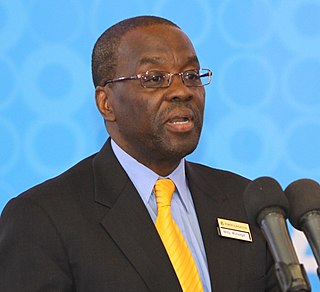
The politics of Kenya take place in a framework of a presidential republic,whereby the president is both head of state and head of government,and of a multi-party system in accordance with a new constitution passed in 2010.

Stephen Kalonzo Musyoka is a Kenyan politician who was the tenth Vice-President of Kenya from 2008 to 2013. Musyoka served in the government under the late President Daniel arap Moi as the Secretary of Kenya African National Union party (1980-1988),Assistant Minister for Works (1986-1988),Deputy Speaker of the National Assembly (1988-1992),Minister for Foreign Affairs from 1993 until 1998,Minister of Education (1998-2001);and subsequently,under the late President Mwai Kibaki,he was Minister of Foreign Affairs again from 2003 to 2004,then Minister of the Environment from 2004 to 2005. He was an unsuccessful candidate in the 2007 presidential election,after which he was appointed vice-president by Kibaki in January 2008.

Amos Wako is a former Attorney General of Kenya and the first senator for Busia County from 2013 to 2022. Wako won the senatorial seat after defeating former minister of finance Chris Okemo. He won the senator seat on an Orange Democratic Movement (ODM) being led by former Prime Minister Raila Odinga. Wako currently serves as Deputy Chairman of the Committee of Constitutional Experts for Drafting the EAC Political Federation Constitution,the committee drafting the constitution for the East African Confederation.

Raila Amolo Odinga is a Kenyan politician who served as the Prime Minister of Kenya from 2008 to 2013. He was the Member of Parliament (MP) for Langata Constituency from 1992 to 2013 and has been the Leader of Opposition in Kenya since 2013. He is the leader of Azimio la Umoja–One Kenya Coalition Party.

Doudou Diène is a Senegalese jurist. He was United Nations Special Rapporteur on contemporary forms of racism,racial discrimination,xenophobia and related intolerance from 2002–2008.

The Wiper Democratic Movement–Kenya (WDM-K),formerly Orange Democratic Movement–Kenya (ODM–Kenya),is a political party in Kenya,which originated as a result of the 2005 Kenyan constitutional referendum. The party tends to be more popular among the Kamba people. It is headed by Kalonzo Musyoka,who ran for president in 2007 and served as the vice-president in the Grand Coalition of Mwai Kibaki and Raila Odinga. He is now a member of the main opposition Azimio La Umoja One Kenya Party.
Defamation of religion is an issue that was repeatedly addressed by some member states of the United Nations (UN) from 1999 until 2010. Several non-binding resolutions were voted on and accepted by the UN condemning "defamation of religion". The motions,sponsored on behalf of the Organization of the Islamic Conference (OIC),now known as the Organisation of Islamic Cooperation,sought to prohibit expression that would "fuel discrimination,extremism and misperception leading to polarization and fragmentation with dangerous unintended and unforeseen consequences". Religious groups,human rights activists,free-speech activists,and several countries in the West condemned the resolutions arguing they amounted to an international blasphemy law. Critics of the resolutions,including human rights groups,argued that they were used to politically strengthen domestic anti-blasphemy and religious defamation laws,which are used to imprison journalists,students and other peaceful political dissidents.
Expression of racism in Latvia include racist discourse by politicians and in the media,as well as racially motivated attacks. European Commission against Racism and Intolerance notes some progress made in 2002–2007,mentioning also that a number of its earlier recommendations are not implemented or are only partially implemented. The UN Special Rapporteur on contemporary forms of racism,racial discrimination,xenophobia and related intolerance highlight three generally vulnerable groups and communities:ethnic Russians who immigrated to Latvia under USSR,the Roma community and recent non-European migrants. Besides,he notes a dissonance between "opinion expressed by most State institutions who view racism and discrimination as rare and isolated cases,and the views of civil society,who expressed serious concern regarding the structural nature of these problems".

General elections were held in Kenya on 4 March 2013. Voters elected the President,members of the National Assembly and newly formed Senate. They were the first elections held under the new constitution,which was approved in a 2010 referendum,and were also the first run by the new Independent Electoral and Boundaries Commission (IEBC). They coincided with the 2013 Kenyan local elections.

Willy Munyoki Mutunga,EGH is a Kenyan lawyer,intellectual,reform activist,and was the Commonwealth Special Envoy to the Maldives. He is also an active member of the Justice Leadership Group. He is the retired Chief Justice of Kenya and President of the Supreme Court of Kenya.

The Judicial Service Commission (JSC) of Kenya is an independent Commission established under Article 171 of the Constitution of Kenya. Its mandate as stipulated in Article 172 of the Constitution is to promote and facilitate the independence and accountability of the Judiciary and the efficient,effective and transparent administration of justice. The commission has 11 members with the initial team appointed in December 2010.

The Supreme Court of Kenya is the highest court in Kenya. It is established under Article 163 of the Kenyan Constitution. As the highest court in the nation,its decisions are binding and set precedent on all other courts in the country.
Smokin Wanjala is a Kenyan lawyer and a justice of the Supreme Court of Kenya. He holds a Ph.D. in law from the University of Ghent,Belgium. He also holds a Master of Laws degree from the Columbia University in the United States and a Bachelor of Laws (LLB) degree from the University of Nairobi. Wanjala lectured at the University of Nairobi for 15 years,teaching international law,international human rights law,land law and criminal law.

Miguna Miguna is an Advocate of the High Court of Kenya. He practices law as an attorney,a barrister and solicitor in Toronto,Canada. Miguna served as a senior adviser to former Kenyan Prime Minister Raila Amollo Odinga from 2009 to 2011.
The Kenya Presidential Election Petition of 2013 was an election petition aiming to declare the Kenya presidential election 2013 invalid. The Petition was filed at the Supreme Court of Kenya on 16 March 2013.

Presidential elections were held in Kenya on 26 October 2017 following the Supreme Court's annulment of the results of the presidential vote in the August 2017 general elections. The election was won by incumbent president Uhuru Kenyatta of the Jubilee Party,who won 98.3% of the popular vote to defeat Raila Odinga of the Orange Democratic Movement (ODM).
Paul Kihara Kariuki is a Kenyan lawyer and a former court of appeal president and judge. He was nominated for the post of Office of Attorney General of Kenya by President Uhuru Kenyatta on 13 February 2018 following the resignation of Githu Muigai.
E. Tendayi Achiume is a Professor of Law and former Faculty Director of the Promise Institute for Human Rights at the University of California,Los Angeles. She served as the United Nations special rapporteur on Racism,Racial Discrimination,Xenophobia and Related Intolerance from her appointment in September 2017 until November 2022. She was the first woman appointed to this position since its creation in 1993.

General elections were held in Kenya on Tuesday,9 August 2022. Voters elected the president,governors,senators,members of the National Assembly,and members of county assemblies.
David Ndii &Others V. Attorney General &Others also known as the BBI Judgement, was a landmark ruling made in the Kenya High Court on 13 May 2021,which issued an injunction on Kenya's Independent Electoral and Boundaries Commission (IEBC) from proceeding with President Uhuru Kenyatta's and retired Prime Minister Raila Odinga's Building Bridges Initiative. The five-judge bench was to determine seventeen questions raised on the petition against the BBI Process.










